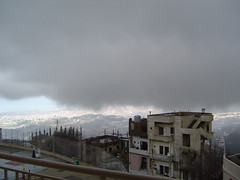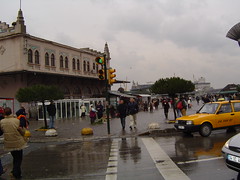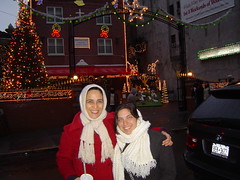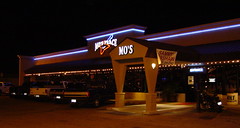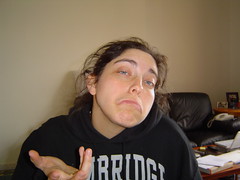
Ma ba3rif
Originally uploaded by Jane Rubio.
So the other day I was talking in Arabic to the maintenance guy in front of my 7th graders. Afterwards one of them said, "Miss, you speak like an Egyptian trying to talk Lebanese."
I studied Arabic for one year at Harvard ten years ago. I learned the formal written language, fusHa, with some Egyptian colloquial. The rationale being that most of the media in the Arab world comes out of Cairo. Then about five years after that, I took private lessons with an Egyptian woman in her home. It was about two times a week off and on for about two years. I would go after a long day of teaching high school, and would generally fall asleep as she talked to me too fast in Arabic. I wasn't understanding, and it was too much for my tired brain.
I always thought she was so mean because she would make this "tsk" noise when I got something wrong. Now that I'm here in Lebanon, I realize this is how people say "No." Apparently, they do the same thing in Greece.
Much of the language is body langugage. Not only do you have "tsk," with the chin pointing up to mean "No." You have a slight head rattle from side to side to signify "What? I didn't get you." That can also be accompanied by a twist of an open hand at around chin level. Then there's the big pout meaning "I don't know." I show both at the same time in this lovely picture. Okay, maybe the Lebanese don't do it as exaggerated as I do here.
To say "I want" and "I need" is the same word. (I think there's a profound spiritual significance to this.) To say "I like" and "I love" is the same word. It's like that in French, too.
There are a million terms of affection--Habibee (my beloved), Albee (my heart), Hayatee (my life), Omree (my age). These are used between lovers, friends, and shop owners and customers. So it doesn't really mean anything, unless you want it to.
And then there's "Haram." For those who have studied Islam, you might recognize Haram as prohibited, the opposite of Halal, permitted, like Kosher in Hebrew. But in Lebanon it means "poor thing," like "Pobrecito" in Spanish. Except they use it a lot more here than in the Americas. It seems that in every conversation there is some object of pity. "Oh, she came down with a horrible flu this weekend. . . Haram." The intonation of the voice goes down with the second syllable, making it sound very sappy. In a way, people come off caring and sensitive when they say it, but then as my Canadian friend says, there always seems to be a Haram situation. So that after a while, it seems people say it even when things are really, really ugly like war or imprisonment or a baby dying, and then Haram comes off as trite and even foolish. (Or maybe that's just us non-Lebanese using it all wrong.)
I say it all the time now.
But my favorite use of "haram" is when I'm the subject of the sentence. "Haram, Jane, she has to go back to her lonely apartment by herself." "Haram, Jane, she has to take the bus into Beirut by herself." I, of course, don't really think of myself as a Haram Situation. But here in Lebanon, doing things by yourself and living by yourself are pitiable conditions. Most especially if you're female.
And then there's Sorry, which is what you say when you bump into someone and to mean "excuse me". Like to get a waiter's attention, "Sorry." I hate feeling like I'm apologizing all the time.
In general it seems that there are about 5 ways to say the same thing. This is one reason that Arabic is really hard to learn. Along with the fact that almost all study materials are in either FusHa or Egyptian. We've found only one dictionary that has a majority of words that are Lebanese and one good website.
